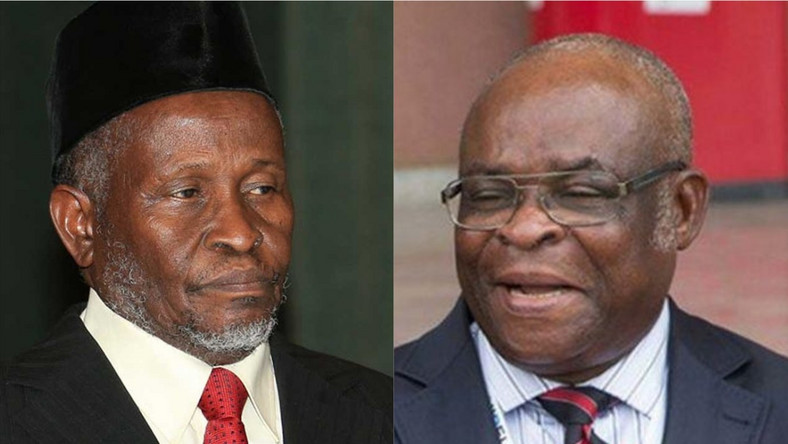Acting Chief Justice of Nigeria, CJN, Justice Tanko Muhammad, Monday, challenged the competence of the suit seeking to declare him unfit to head the judiciary.
In processes he filed before the Abuja Division of the Federal High Court, Justice Muhammad insisted that he was validly appointed by President Muhammadu Buhari to take control of the judiciary, after the erstwhile CJN, Justice Walter Onnoghen, was charged and subsequently indicted by the Code of Conduct Tribunal, CCT.
The Acting Chief Justice of Nigeria, CJN, Justice Tanko Muhammad, Monday challenged the competence of the suit seeking to declare him unfit to head the judiciary.
In processes he filed before the Abuja Division of the Federal High Court, Justice Muhammad insisted that he was validly appointed by President Muhammadu Buhari to take control of the judiciary, after the erstwhile CJN, Justice Walter Onnoghen, was charged and subsequently indicted by the Code of Conduct Tribunal, CCT.
He told the court that the CCT had on January 25, directed Justice Onnoghen to step aside as the CJN, after which he was okayed as his replacement.
In a 39-paragraphed counter-affidavit deposed to by one Sadiq Ahmad, the Acting CJN argued that President Buhari, being the appointing authority, “has the power to remove or suspend any person occupying the office of the CJN.”
He argued that there was no need for President Buhari to consult either the National Judicial Council, NJC, or the Federal Judicial Service Commission, FJSC, before the former CJN could be suspended from office.
Justice Muhammad equally maintained that there was also no need for President Buhari to approach the Senate “for support by majority of two-third votes before the erstwhile CJN could be suspended from office.
“That the 5th Defendant (Buhari) followed due process of law in the appointment of the 3rd Defendant as the Acting CJN.
“That the 5th Defendant has extended the appointment of the 3rd Defendant as the Acting CJN, by another three months, upon the recommendation of the 1st Defendant (NJC).
“I know as a fact that there had not been any negative impact on the Nigerian Judiciary as there is renewed belief by the common man in the judiciary as his last hope”, the Acting CJN added.
Consequently, he urged the court to dismiss the suit entered against him by the Board of Incorporated Trustees of Malcolm Omirhobo Foundation, an advocacy group.
The plaintiff had in its suit marked ABJ/CS/420/2019, urged the court to declare that Justice Muhammad who is currently the most senior jurist at the Supreme Court, was not capable to replace Onnoghen.
Specifically, the group prayed the court to declare that the Acting CJN, having made himself available as a tool used in the violation of the Constitution, especially with regards to the “illegal” removal of the former CJN, is, therefore, not a proper and fit person to be recommended for appointment to head the judiciary.
It is the contention of the plaintiff that the Acting CJN conducted himself in a manner that reduced the confidence of the public in the integrity and impartiality of the Judiciary.
Cited as 1st to 7th Defendants in the suit were the NJC, the FJSC, the Acting CJN, the Federal Government, President Buhari, the Attorney General of the Federation and the Senate.
Meanwhile, in the objection he filed against the suit, the Acting CJN told the court that the NJC had earlier exonerated him of any wrong doing or misconduct.
He argued that the group lacked the locus standi to query decision the NJC delivered in his favour.
Therefore, he asked the court to decline jurisdiction to entertain the suit which he said did not disclose any reasonable cause of action.
Similarly, President Buhari, through the office of the AGF, also challenged the jurisdiction of the court to remove the Acting CJN.
Buhari, who was represented by the Acting AGF and Solicitor General of the Federation, Mr. Dayo Apata, argued that the suit constituted an abuse of court process.
Aside from challenging the locus-standi of the plaintiff to question his choice of Justice Muhammad as Onnoghen’s replacement, President Buhari described the suit as “an academic exercise”.
All the other defendants, apart from the Senate, also asked the court to dismiss the suit for want of merit.
Meanwhile, trial Justice Iyang Ekwo, Monday adjourned the case till Friday for accelerated hearing.
“There is need for expeditious determination of this case, being that it is a matter of public interest.
“All the preliminary objections will be taken together with the substantive matter,” the Judge held.
The Plaintiff is among other things, urging the court to declare that the suspension and/or removal of a CJN from office is a shared responsibility of the 1st Defendant (NJC), 5th defendant (Buhari) and 7th Defendant (National Assembly).
It argued that President Buhari lacked the constitutional powers to unilaterally suspend and/or removal a sitting CJN from office, as was done in the case of Onnoghen.
Besides, it prayed the court to declare that by combined interpretation, sections 1(1 )(2), 231(4), 292(1)(a)(i)(b), 153(1)(i), 158(1) and paragraph 21 (a)(b) of Part 1 of the Third Schedule of the 1999 Constitution, as amended, “it is unlawful and undemocratic for the 4th and 5th Defendants (Federal Government and President Buhari), to declare the office of the CJN vacant on January 25, 2019, and consequently appoint and swear in the 3rd Defendant as the acting CJN”.
It applied for a court order to restrain the National Assembly from confirming any appointment of Justice Muhammad as the substantive CJN.

